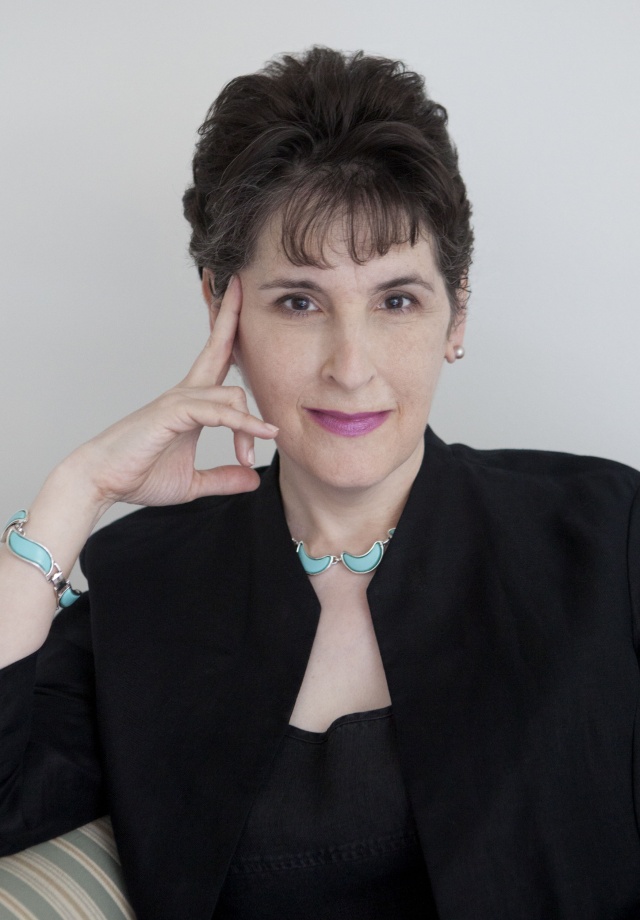
Miss Eve Golden is the author of six theater and film biographies, and her articles on film history have also been collected into two anthologies. After starting her literary career at a New York advertising agency, she worked her way to becoming copy chief at More magazine for seven years, and wrote the humor column “The Bottom Shelf” in Movieline in the 1990s. She has appeared in plays off-Broadway, in summer stock and commercials, and now enjoys a quiet life as a photo archivist, obituary writer, freelance editor, and self-described “stately dowager.”
What is rarely known is that the multi-talented Miss Golden is a woman with a transsexual history, who consented very kindly to an interview with me to talk for the first time in detail about her transition, as well as her life and work, including some questions I had about her literary efforts (which I encourage you to check out!)
Miss Golden, you are obviously a successful woman who has met some highly interesting people in your life. Can you tell me something about your early life – where did you grow up? What career did you envision yourself in when you were a young lady?
I didn’t dare envision anything for myself! I had no idea where or how I would end up. I was very, very lucky, family-wise: I came from a gay-friendly family (my grandmother was a lesbian and quite open about it), and my family had enough money to pay for treatment and surgery; of course, nothing was covered by insurance.
In the era during which you transitioned, the general public was barely aware of transgender people, let alone accepting. It sounds as if your family was very supportive? How about friends and acquaintances?
I lost surprisingly few friends and relatives over this–my grandmother was delighted, as she knew it would horrify my grandfather. A few friends fell away, but no one important–I am still close with a woman I have known since junior high; her awful father even went from calling me “that damn little Jew-boy” to “that damn little Jew-girl,” which I thought was kind of sweet.
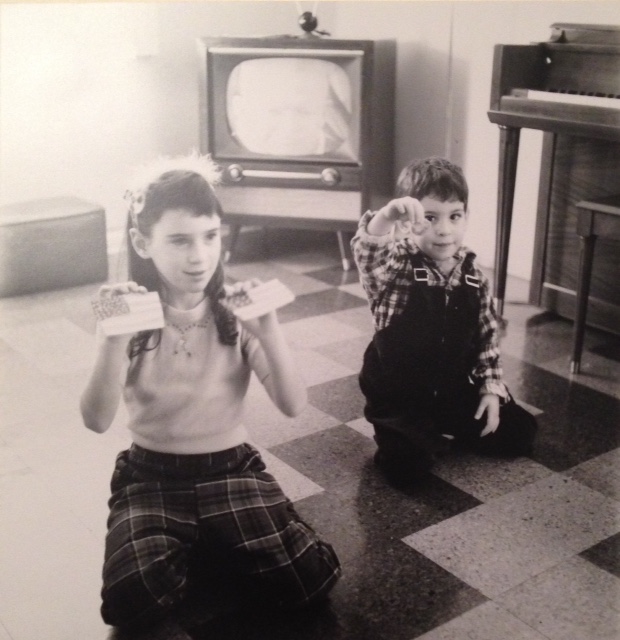
Eve Golden (right) with sister Debbi, watching the JFK inauguration, 1961.
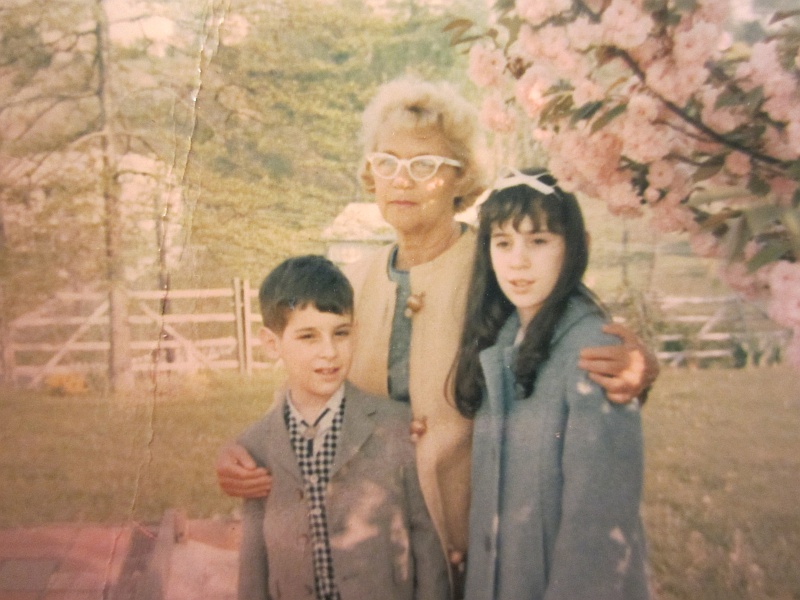
Eve Golden, with grandmother and sister, 1963.
Each of us has their own story to tell about our evolution in this life. When did you realize that your brain and body gender didn’t match?
I remember exactly: second grade, the teacher divided us up for a spelling bee. “Boys over there, girls over there.” Without thinking, I went over with the “other girls” (and you can imagine the reaction!). I had known forever that something was odd, but that was the first time I realized, “oh–of course, I’m a girl, that’s what’s different about me!” I was also smart enough, even in second grade, to keep my trap shut about it.
When did you transition? What was your greatest challenge that you faced?
As soon as I heard my first Christine Jorgensen joke on TV and realized it was possible, I thought, “that’s for me!” Of course, I didn’t know the difference between being gay and being transgendered then–not till I read Jan Morris’ Conundrum in high school. But I leaped right in: started hormones at 18 (I swear to you, my doctor’s name was Kent F. Balls, I am not making that up), started living as a woman at 20, and had surgery the minute I turned 21. Went to college two years as a boy, took a semester off, came back as a girl. The students were very blasé about it, the professors not so much.
The greatest challenge was the psychiatrists. I appreciate and agree that the hurdles should be high for this–but gee whiz, some of the boneheads I had to kiss up to! One wanted me to have sex with men and women, so I would know “what I wanted” (I walked right out of his office), and another told me, “I think you may be showing symptoms of maladaptive repression.” I smiled sweetly and said, “But aren’t the symptoms of maladaptive repression concomitant to those of adaptive sublimation?” They hate it when you do that.
(Laughs) I have read many autobiographies and biographies of transgender persons, and I read and thoroughly enjoyed Conundrum; Morris has a way with words which put her at an entirely different level which resonated strongly with me. I can still pick from memory how Morris described the oddness of transition in between hormones and surgery, where she felt like a “mythological creature” – but in a good way, not like the Minotaur.
The era in which you transitioned was still the early ages of surgery, and some of the horror stories from the biographies of transsexual women are terrifying to read (such as Canary Conn’s transition story, which can at best be called medical torture). What’s more, social acceptance of our people at that time was somewhat lacking, to say the least.
I was very lucky, my mother and sister and grandmother were very supportive (after the initial surprise, of course). My main problem was finding anyone in the psychiatric and surgical community who knew anything or could do anything in the 1970s! The doctor asked me if my mother had taken any hormones. I asked her, and she said yes, she was given DES in her 7th week to prevent miscarriage. Doctor said, “yep, I thought so, I hear that a lot.”
Do you recall how you were treated in the hospital?
I remember I asked the surgeon if I would be able to play the piano after surgery and he said, “Yes, of course,” and I replied, “Oh, good–I’ve always wanted to be able to play the piano!” He had no sense of humor, but the nurse laughed.
What gave you the strength and courage to make that final leap of faith?
As far as being strong, I would say I am just so hard-boiled you could roll me on the White House lawn.
Were there any other transgender stories which inspired you? And given your popularity and the many social circles you interacted in, did you ever meet any “famous” transpeople? If so, can you talk about them?
I know very few transgender people–after all, we only have one thing in common!–and most of the memoirs I have read have either been “poor pitiful me” or coma-inducing doctoral theses. I do have a copy of the 1933 biography of Lilli Elbe, that and Jan Morris’ work are probably my favorites on the subject. Jan and I actually became friends, because we had the same literary agent–it had nothing to do with our shared past. She is one of my role models: a jolly old tweed-suited Welsh auntie doing the work she loves.
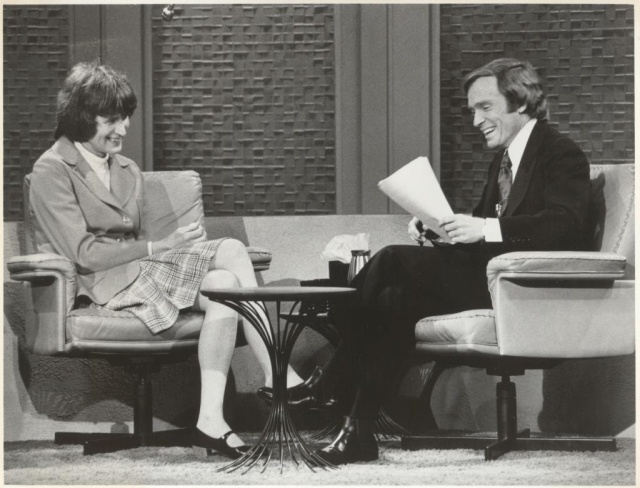
Jan Morris on the Dick Cavett Show, recorded April 30, 1974.
I could never think of you as either an auntie in tweed, or a dowager as you describe yourself; you look beautiful.
You look gorgeous–I would kill for your bone structure and little goyishe nose!
Thank you! What careers did you have leading up to writing your first book, Platinum Girl? What inspired you to begin writing in the beginning?
Well, I was gifted with three tiny talents: I’m a good actress, a good artist and a good writer. I am not great at any of them, sadly. I gave all three a try–went to art school and worked as a fashion illustrator and advertising layout artist; studied theater in college and acted for about five years (Off-Broadway, commercials and summer stock, mostly). Pretty much a flop at both of those.
You told me in an earlier conversation about the real-life drudgery of working your way up the ladder and needing to be hungry to act – did you have a favorite role you played as an actress? And would I have possibly seen you in any commercials or films?
I did love acting–there is nothing like being onstage and knowing you are doing this right and the audience is loving it. I was the worst dramatic actress in the world–I once played Amanda in Glass Menagerie that came off like a Eunice and Mama sketch–but I was a darned good light comedienne. I’d actually love to play the Emcee in Cabaret–there is no reason that has to be a male role, I see her as a washed-up old Tiller Girl, like Lotte Lenya or Rosa Valetti. Oh, and Lady Bracknell–another role I’d adore.
I wanted to play Tallulah Bankhead in college–do a one-woman show from her memoirs, cut down to 90 minutes–but no, I was blacklisted. The head of the theater dept. told me he would never allow me onstage, I would be a distraction–and what if an actor had to play a love scene with me? It was the ‘ 70s, no one thought about civil rights or lawsuits then.
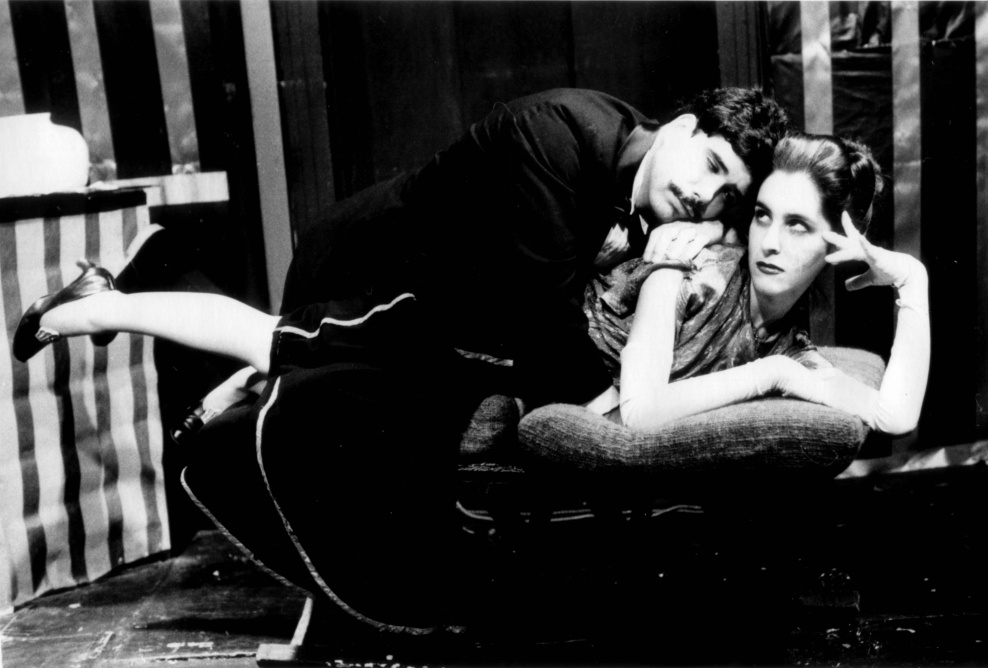
Eve Golden in an Off (Off!) Broadway play, 1981.
What were your early work experiences after college?
Anyway, just like Peggy in Mad Men, I was working as a secretary at a New York advertising agency and talked my way into a copywriting position. I was always interested in old movies and annoyed that there was no good book about Jean Harlow–naive little thing that I was, I thought, “well, why don’t I write one myself?” Having no idea what I was getting into.
I know that the setting of Mad Men antedates your tenure as a secretary, but was the climate you had to work in similar to what is portrayed on the television series?
The Corporate World of the 1980s in New York still had a lot of early ’60s in it–we had our bottom-pinchers and bottles in desk drawers and three-martini lunches and yes, I got coffee and was flirted with by the bosses. I thought it was all a lark, though. I was actually hired out through an agency called Tempting Temps! My old office friend Kathy and I still call ourselves the Temp Temptresses. We dressed like Hope Lange in The Best of Everything and camped it up and had a grand old time. You couldn’t sexually harass us, we would laugh and sexually harass you right back.
A question I know many want me to ask: Studio 54, the Village, Danceteria, CBGB. Did you hang out at any of them, and have any wild times? Meet some famous people?
Oh, gosh, the 1980s were such a great time to be young and cute and slutty in New York! Every weekend I was at Palladium, Limelight, The Saint, Roller Roxy, Heartbreak, the Surf Club, the Tunnel, Mars Needs Men, 4D, Cat Club . . . all those cute young Wall Streeters and Eurotrash. I followed my mother’s advice, though: “Never go home with a man you just met, he may turn out to be a serial killer.” Years later I told my mother, “You know all those guys I didn’t go home with? I’ll bet only one or two of them would have turned out to be serial killers.”
(Laughs) I’m not recalling any serial killers who stalked their prey at Mars Needs Men. What was the meaning of the photo you sent me, of the fried egg hat and the cord around your throat?
My Fried-Egg Hat, designed by my friend Keith Greene, got me into all the hot new clubs. Doormen would spot me in the crowds outside and go, “Fried Egg–you’re in!” and wave me inside. The extension-cord necklace was just because, well, it was the ’80s.
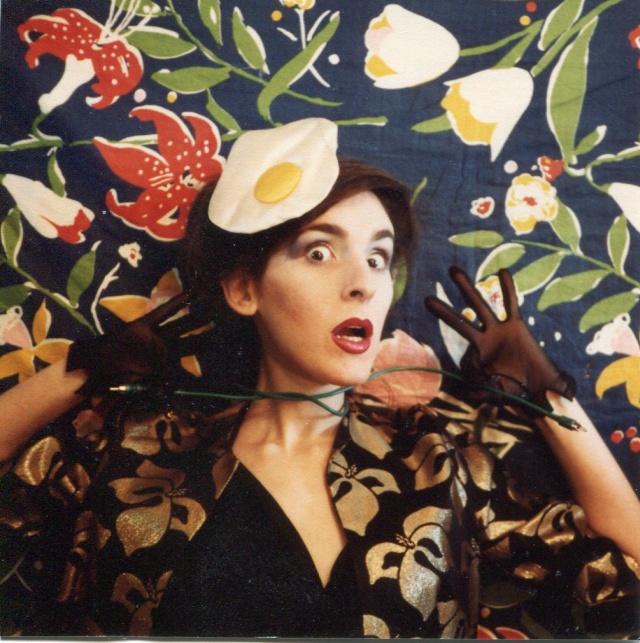
Eve Golden out on the town, New York, early 1980s.
I found a photo of you at the Algonquin Hotel in New York, and I believe you are a big fan of Ms. Parker and her “round table.” Did you yourself form a group of friends or contemporaries which you would meet with to discuss literary and social topics in a similar manner? If you could go back in time, do you think you would have fit in comfortably at Ms. Parker’s table?
The Algonquin crowd would have torn me to shreds, I would have been terrified to open my mouth. Besides its historical significance, the Algonquin is just a great place to meet for tea or after-work drinks. It’s quiet, so you can talk and be heard, it has comfy chairs and sofas, and if you are feeling all Mad Men, the Blue Bar is very 1962. They also make a great Mojito.
Just so I know what to buy you the next time I come to New York, what is your drink of choice?
I tried absinthe, but was never able to get past the “licorice and jet fuel” taste. My drink of choice these days is a Blue Marilyn–it’s what Blythe Danner drank on Will & Grace, so it is The Gayest Drink In The World. I simplified the recipe to 3 parts peach vodka and 1 part blue curaçao, though. I leave out the cherry Sucret.
Touching on the transgender topic one final time, do you think in your lifetime that we can arrive at that point, where saying “I’m transgender” creates about as much controversy as saying “I’m Presbyterian?”
I am a bitter old pessimist; I suspect that the vast majority of people will always think of us as delusional freaks and dirty jokes–even if they are polite enough not to say so to our faces. But then, I never thought I’d see same-sex marriage in my lifetime, so maybe I’m wrong.
What draws you to the older, “classic” films and their stars? Is there a certain something which attracts you?
That is a mystery! Why do some people get obsessed with the Civil War or archeology or religion or Fabergé eggs or classic cars? The mind is an odd thing, I have no idea why old movies caught my fancy. Maybe having to pretend I was something and someone I wasn’t for so long had something to do with it.
I think that is highly insightful.
Thanks!
I watched a video recording from 2008, where you expounded that “…YouTube is the new Vaudeville in some ways, it’s not the same experience for the audience of course…you can see the latest acts, you can see people who aren’t yet famous and might be some day…” With Google’s purchase of YouTube and much greater restriction on copyrights and content, do you still feel that way?
I still love YouTube–I think it is the only thing about this century I approve of. The reason it’s like Vaudeville is you get a little of everything–music, comedy, drama, animal acts, parodies, you name it–just like an evening at Tony Pastor’s. If you don’t like Eddie Cantor, the Irwin Sisters will be on next.
I can imagine that writing Platinum Girl must have been fun, challenging, and intimidating. How difficult (or easy) was it? Was there something about Jean Harlow and her life which made you decide that she was going to be your “first?”
When you’re young and dumb, everything seems like it’s going to be easy–I managed to get an agent and a publisher and an advance for Platinum Girl (I have never liked that title, by the way, sounds like Buffalo Gal), and it got good reviews and sold well–I thought it was always going to be that easy! All my books since then have been on a smaller scale–but I have been very lucky to have hooked up with a good University Press for my most recent four books (and my next ones, I hope). Biographies are so damn expensive to write that I will never make a living off them–it’s a hobby, not a career–but I could not be happier with my publisher and have never had a bad experience with them.
I can see that. So if I understand this, was Jean Harlow your “first” because the topic was marketable?
It was sheer luck–I found a good agent and a good publisher, and people wanted to read about Jean Harlow–there hadn’t been a book on her in ages; the stars aligned. Of course, book publishing, marketing and selling is a whole different world than it was 30 years ago. Publishers do not even have in-house editors anymore, they farm all that out freelance, and it shows.
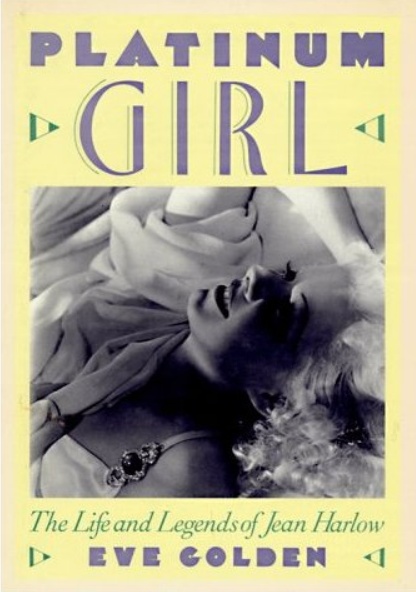
Platinum Girl: The Life and Legends of Jean Harlow, by Eve Golden.
I’m interested in your take on fashion, given that you were a fashion illustrator. What fashion trend or trends are your favorites?
I am a Philadelphia Dowager. My tastes are very casual, low-key: twinsets, pearls and circle pins, tweed skirts, sensible walking flats. When Clinton Kelly on What Not to Wear told a victim that she “dressed like a tranny,” I looked at myself and said, “Really? She looks like a Lands’ End catalog?” Oh, I also stopped watching What Not to Wear after that.
Perhaps I can envision you in tweed after all…
Silent film actress Theda Bara is a mysterious figure to even those who have seen her few surviving films. It’s a tremendous loss that so many of her films were destroyed in the 1937 New Jersey fire. You carried out a diligent amount of research in your biography Vamp: The Rise and Fall of Theda Bara. Do you think that if you had been able to gain access to the dozens of lost films it may have changed your portrayal of her and her life? Or do you think you were able to really understand her from your research?
I’d love to have seen more Theda Bara films, of course–I was able to see the four that still exist, but you can’t get a good take on her talents from that, especially as her best work is missing. It’s the same when I write about theater people–one really has to go from the reviews. Now, with Jean Harlow, Kay Kendall, and John Gilbert, I was able to see everything they did, from the early extra work to their last films, and could offer my own opinions.
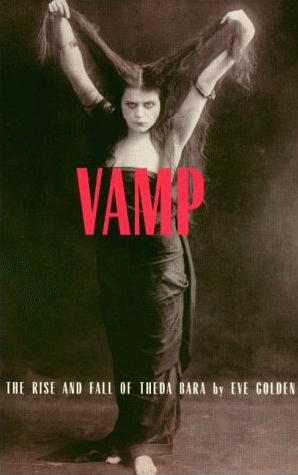
Vamp: The Rise and Fall of Theda Bara, by Eve Golden.
Did you have any great romances in your day? Was there ever “the one?” Was there ever any thought of marriage at some point?
Really, dear, you must leave a lady some secrets. Let’s just say that as of today I am a contented spinster.
I suppose next you’ll be telling me you have become a cat lady? Do you have any pets?
No pets, not even a houseplant. I had cats. They get sick and die, and you pay the vet $3,000 and they give you back a dead cat. I can get a dead cat for free on the street.
So cats are definitely off the table…what do you do to relax and unwind?
Reading, writing (I actually write letters, to friends, and put them in the mail!), having lunch, drinks or dinner with friends, the occasional theater or museum outing.
Do you have another book in the works, and can you give us a hint about the topic? Or are you focusing more on essays and reviews?
I don’t want to jinx myself, but I am just starting a book on a fascinating but long-neglected figure of late 19th-century Broadway, who’s never been written about. The hardest part of being a biographer is finding a viable subject–either another author is already working on a book (Joan Crawford, Mabel Normand), the family won’t cooperate (Jayne Mansfield, Betty Grable), or there is just not enough material to get a book out of (Bert Savoy, Georgiana Drew Barrymore, Helen Kane).
I’ve started writing a biography myself, and it’s incredibly difficult to not have it turn into a shaggy dog of a topic. Given the extensive care and attention to detail I’ve seen in your work, how long does it take you to research and write one of your biographies?
I try to keep it to one year “door-to-door” (contract signing to manuscript submission). I may not be good, but I am fast and professional!
Would you like to discuss your current profession?
I work at a photo archive–we supply photos of all kinds (celebrities, history, artwork, nature) to newspapers, websites, magazines, TV, movies, ads. My favorite part of my job is being Queen of the Dead: whenever a famous person dies, I write their obit, compile all the photos we have of them, and rush it off to the media, like Brenda Starr, Girl Reporter. I have off-site access, so death never takes a holiday and I can kill from home nights and weekends, too.
I’ve read your collection of essays, Golden Images. Have you considered writing media criticism and commentary on a blog of some sort?
Nah–if I were 30 years younger I’d be all over the Internet, but I am too old and tired, I’d rather go to bed with a book.
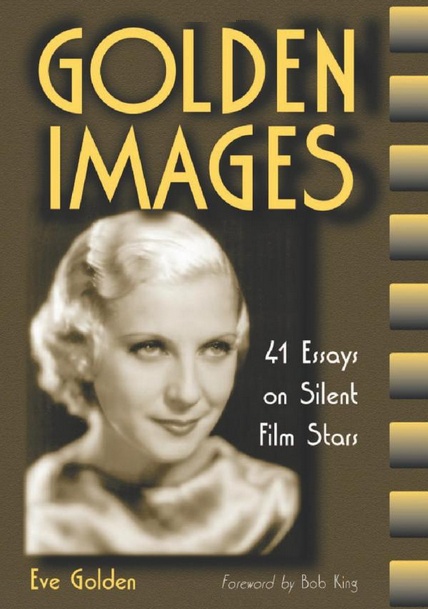
Golden Images: 41 Essays on Silent Film Stars, by Eve Golden.
Final question – on the whole, are you satisfied with your life? Are you happy?
“Happy?” Don’t be absurd. You know who’s “happy?” Idiots and crazy people, that’s who. “Functional” is all any sensible person should aim for.
Miss Golden, I want to close by thanking you tremendously for spending so much of your time answering my questions and opening up to me on a very personal subject.
Footnote: The byline “Queen of the Dead” was previously used by Eve Golden for her work featured in The Daily Mirror.
Some miscellaneous photos of Eve Golden which she sent to me.
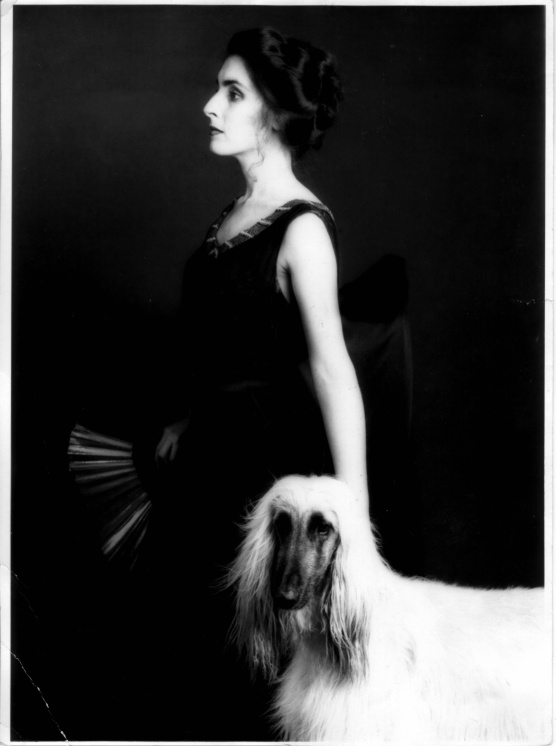
Eve Golden wearing a scarlet red, silk and velvet dress from 1931, photo taken 1979.

Eve Golden on stage for summer stock, 1981.
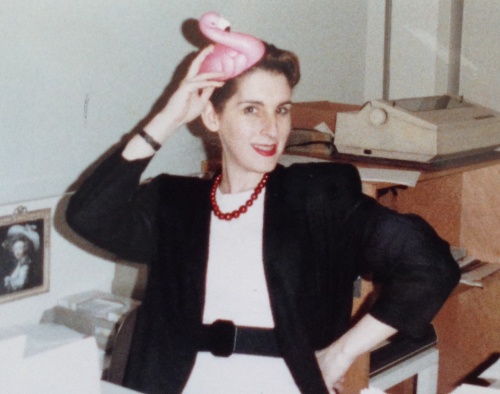
Eve Golden working as a receptionist at Cove Cooper Lewis, 1987.

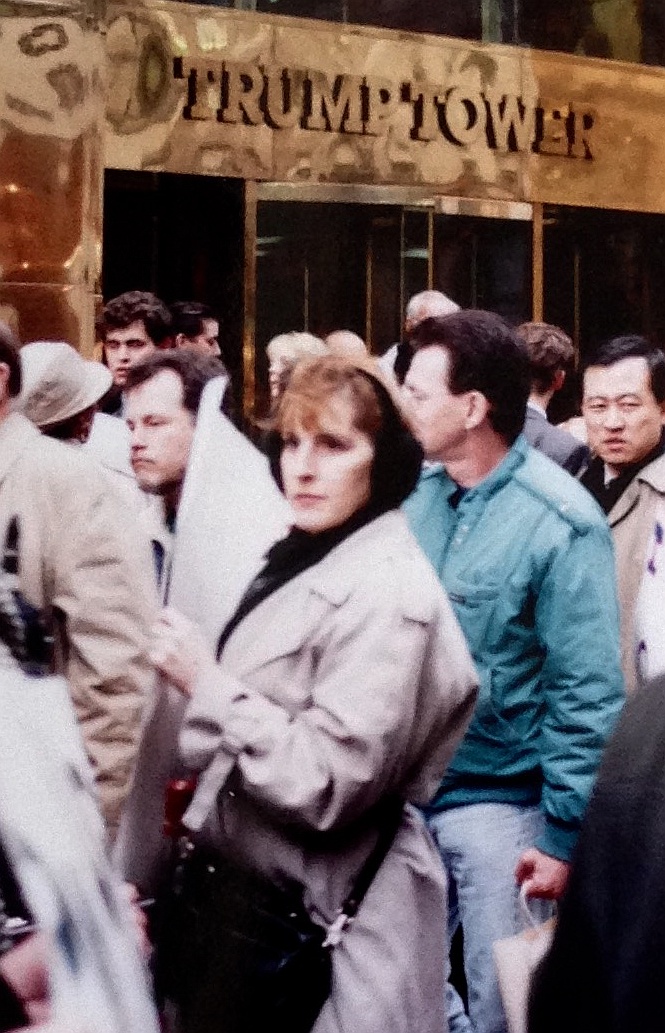
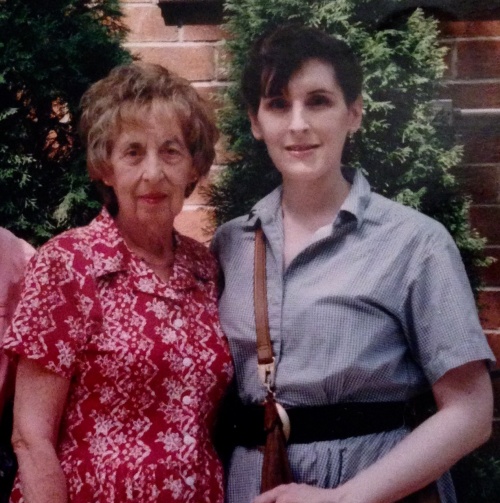
Pingback: EXCLUSIVE: Una Interviews Author, Socialite, and Actress Eve Golden | Transas City
I have known Eve for about 8 years or so and must say this was the best Eve interview! As usual she made me laugh. Eve was my mentor and a wonderful confidant during the time I was researching and writing my own first biography. The book is the story of Peg Entwistle, the so-called “Hollywood Sign Girl” actress that jumped off the H of the Sign in 1932.
Eve wanted very much to do a book on Peg, but when she discovered I was firmly buried in it (pun probably intended), she was gracious enough to not steamroll over this rookie and instead she offered help. Eve was such a gentlemen *ahem* about it all and in many ways was like an understanding “Jewish mother.” (Her term!)
There was a circle of friends of Eve’s with whom I was often included during daily e-mails normally regarding us picking on people doing silly stuff, or weird news stories and hilarious websites. (Have you seen the Hitler Kitties!?) These friends knew of Eve’s Transgender, but I did not. I am a Straight, rather gruff veteran, and maybe Eve was afraid I’d go crazy on her. So, one day during our round robin e-mails I said some joke about Eve “having a lot more balls” than me.
Well, apparently that brought down the house with the others and Eve. A short while later I get a private note from her telling me much of what your Interview covered. I actually wept and felt such empathy for the difficult times she must have endured in an era of so little understanding. I was really very moved. Oh, yes, I had a few minutes of staring at the note … but not in anger, just in awe of 1. how good she looked, and 2. how much courage it must have taken to maintain dignity in the face of humiliating mopes like that theater moron.
I have only know Eve as the woman I met, and, to quote Billy Joel, “she’s always a woman to me.”
Thank you very much for the compliment, James, but it isn’t difficult to have a good interview when your subject is so interesting and entertaining.
I was very fortunate to have met Eve Golden on a few favorite Facebook sites and honored to have an exchange of emails with her. She was a handsome little boy and turned into a pretty woman who has intelligence, wit, and charm.
I don’t pretend to understand what she went through and wouldn’t presume to judge. I am just happy the she if free to be who she is and want her to keep entertaining me with her books.
Pingback: OBITUARY: Transgender Actress Holly Woodlawn (1946 – 2015) | Transas City